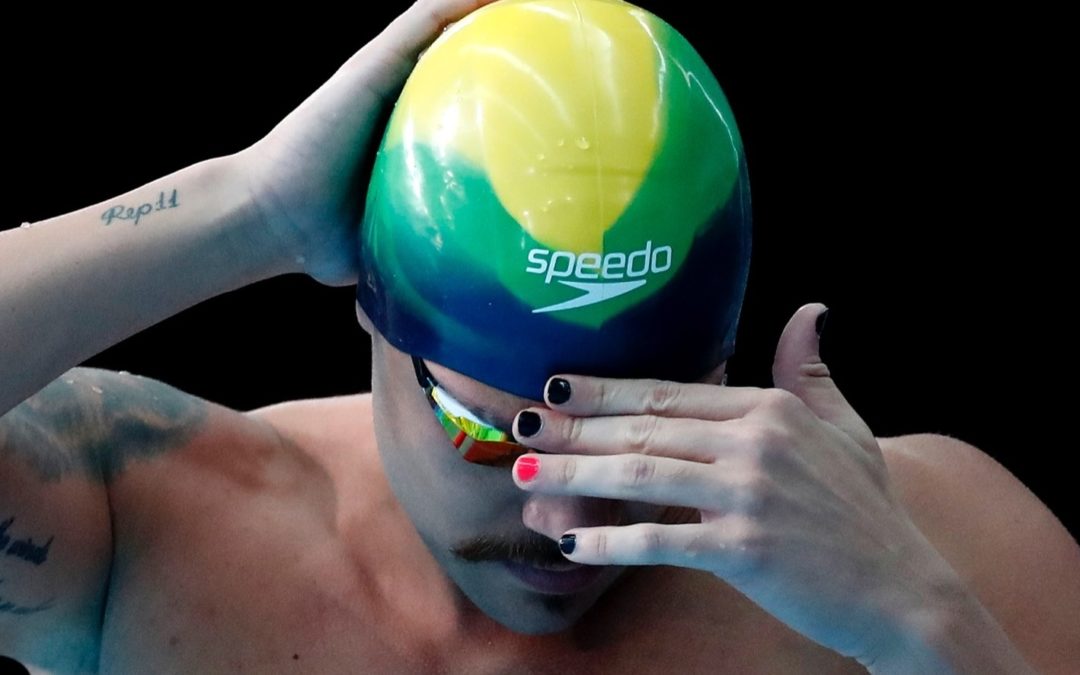Photo: Satiro Sodré/SSPress/CBDA
Author: Thiago Genaro
“Marcel, I have to go.”
Felipe abandoned training, got out of the pool and went to the shower. His head didn’t stop. Thoughts were racing. The restless mind. Inattention harmed the strokes. Irritability disrupted his rhythm of breathing. How can you balance the intense training of a professional athlete, in preparation for the Brazilian Swimming Championship, with symptoms of hypomania?
Marcel is Felipe’s coach and knew about his diagnosis. Marcel knew that treatment for bipolar disorder sometimes takes months to adjust.
Felipe Ribeiro’s (@ribeiro_lipers) swimming story begins as a child, in swimming pools, in his passion for the sport, in his love for life. Being an athlete is not about enjoying it. It’s about loving, about having passion.
An intense, extroverted boy who is surprised by an abrupt and debilitating change in mood. At the age of 15, Felipe experienced his first depressive episode. Like many bipolar patients, the first diagnosis was unipolar depression. Felipe received antidepressants. The response was small, resulting in a change of medications. This change also resulted with little response.
Halfway through training, some mood episodes with days of irritability, restlessness, reduced sleep hours, and accelerated thinking caused Felipe to think:
“It must be anxiety about the next competition.”
It Was not. These were episodes of hypomania. The doctors were unable to distinguish at that time what was hypomania and what was anxiety. Antidepressants were continued. And again they failed. Arrhythmia cannot be treated with high blood pressure medication.
At the end of 2022, Felipe talks about a different feeling:
“I experienced something strange. I felt irritable, I was restless, I slept little. But I was also sad, without pleasure in anything. It was a mix of things. I didn’t understand if I was up or down. It was really bad.”
Felipe was experiencing mixed episodes, that is, mood polarizations in which the patient simultaneously experiences depressive and manic symptoms.
Performance in training fell. Felipes motivation is gone.
Why swim? Who do I swim for? Why do I compete? Were some of the thoughts going through Felipe’s mind.
In February 2023, 8 years after his first depressive episode, Felipe was diagnosed with bipolar disorder. Many patients are misdiagnosed as “depression with anxiety” for years before being diagnosed with bipolar disorder.
Felipe was misdiagnosed for 8. Some Medical literature says the average is 12 years.
Once the proper treatment started, Felipe resumed training. In May 2023, at the Brazilian Swimming Championship, he qualified for the World Championship in Japan and the Pan-American Championship in Chile.
Between Asia and Latin America, Felipe was hanging out with two friends who were painting their nails.
“Can you paint mine too?”
Bipolar Disorder has taken away nights of sleep for Felipe. At times, it may have stolen hope and joy. But it didn’t end his extroverted side, his hunger for the world. Why not color your nails?
I spoke to him in December 2023:
“I don’t understand, Felipe. Are your nails pink when you’re manic and black when you’re depressed?”
“No, Thiago. Coloring my nails speaks of my desire to live. From my extroverted side. Of the colors of the world.”
I ask whether, with the treatment, the emotional stability obtained contributed to the improvement in performance in the pools:
“Absolutely. Being stable helps with my concentration, my focus, my discipline and my results.”
Under treatment for Bipolar Disorder since February 2023, Felipe resumed training, improved his performance, participated in championships and regained the colors of his life.
Pink and Black?
Not only. It seems he likes gold too.
Felipe was a gold medalist in the 4x100m freestyle relay, at the Pan-American Games, in Santiago, in October 2023.
Thiago Lopes Genaro is a psychiatrist in São Paulo, Brazil. He is part of the clinical staff of Conexa Saúde, Hapvida,
MentalMe, Hospital Nipo-Brasileiro and Hospital Israelita Albert Einstein atendimento@talkpsiquiatria.com.br
The content of the International Bipolar Foundation blogs is for informational purposes only. The content is not intended to be a substitute for professional medical advice, diagnosis, or treatment. Always seek the advice of your physician and never disregard professional medical advice because of something you have read in any IBPF content.


